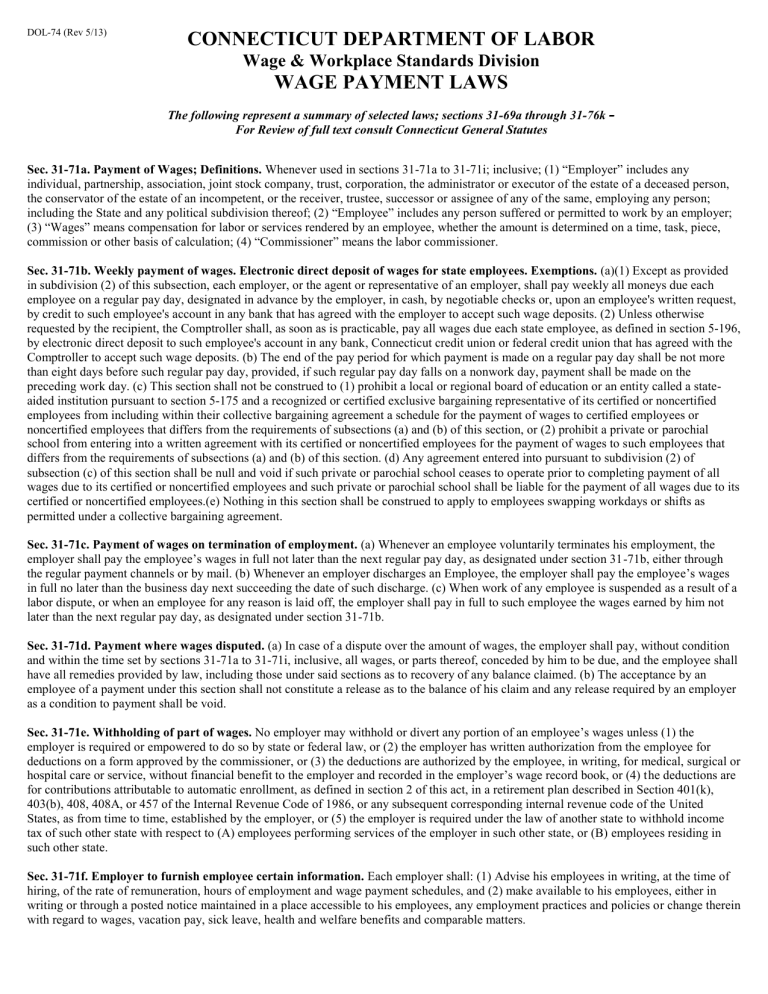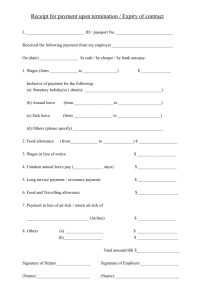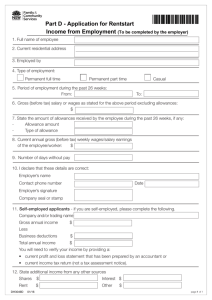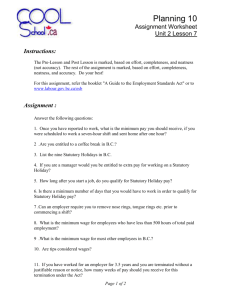CONNECTICUT DEPARTMENT OF LABOR WAGE PAYMENT LAWS

DOL-74 (Rev 5/13)
CONNECTICUT DEPARTMENT OF LABOR
Wage & Workplace Standards Division
WAGE PAYMENT LAWS
The following represent a summary of selected laws; sections 31-69a through 31-76k
–
For Review of full text consult Connecticut General Statutes
Sec. 31-71a. Payment of Wages; Definitions. Whenever used in sections 31-71a to 3171i; inclusive; (1) “Employer” includes any individual, partnership, association, joint stock company, trust, corporation, the administrator or executor of the estate of a deceased person, the conservator of the estate of an incompetent, or the receiver, trustee, successor or assignee of any of the same, employing any person; including the State and any political subdivision thereof; (2) “Employee” includes any person suffer ed or permitted to work by an employer;
(3) “Wages” means compensation for labor or services rendered by an employee, whether the amount is determined on a time, task, piece, commission or other basis of calculation; (4) “Commissioner” means the labor comm issioner.
Sec. 31-71b. Weekly payment of wages. Electronic direct deposit of wages for state employees. Exemptions. (a)(1) Except as provided in subdivision (2) of this subsection, each employer, or the agent or representative of an employer, shall pay weekly all moneys due each employee on a regular pay day, designated in advance by the employer, in cash, by negotiable checks or, upon an employee's written request, by credit to such employee's account in any bank that has agreed with the employer to accept such wage deposits. (2) Unless otherwise requested by the recipient, the Comptroller shall, as soon as is practicable, pay all wages due each state employee, as defined in section 5-196, by electronic direct deposit to such employee's account in any bank, Connecticut credit union or federal credit union that has agreed with the
Comptroller to accept such wage deposits. (b) The end of the pay period for which payment is made on a regular pay day shall be not more than eight days before such regular pay day, provided, if such regular pay day falls on a nonwork day, payment shall be made on the preceding work day. (c) This section shall not be construed to (1) prohibit a local or regional board of education or an entity called a stateaided institution pursuant to section 5-175 and a recognized or certified exclusive bargaining representative of its certified or noncertified employees from including within their collective bargaining agreement a schedule for the payment of wages to certified employees or noncertified employees that differs from the requirements of subsections (a) and (b) of this section, or (2) prohibit a private or parochial school from entering into a written agreement with its certified or noncertified employees for the payment of wages to such employees that differs from the requirements of subsections (a) and (b) of this section. (d) Any agreement entered into pursuant to subdivision (2) of subsection (c) of this section shall be null and void if such private or parochial school ceases to operate prior to completing payment of all wages due to its certified or noncertified employees and such private or parochial school shall be liable for the payment of all wages due to its certified or noncertified employees.(e) Nothing in this section shall be construed to apply to employees swapping workdays or shifts as permitted under a collective bargaining agreement.
Sec. 31-71c. Payment of wages on termination of employment. (a) Whenever an employee voluntarily terminates his employment, the employer shall pay the employee’s wages in full not later than the next regular pay day, as designated under section 31 -71b, either through the regular payment channels or by mail. (b) Whenever an employer discharges an Employee, the employer shall pay the employe e’s wages in full no later than the business day next succeeding the date of such discharge. (c) When work of any employee is suspended as a result of a labor dispute, or when an employee for any reason is laid off, the employer shall pay in full to such employee the wages earned by him not later than the next regular pay day, as designated under section 31-71b.
Sec. 31-71d. Payment where wages disputed. (a) In case of a dispute over the amount of wages, the employer shall pay, without condition and within the time set by sections 31-71a to 31-71i, inclusive, all wages, or parts thereof, conceded by him to be due, and the employee shall have all remedies provided by law, including those under said sections as to recovery of any balance claimed. (b) The acceptance by an employee of a payment under this section shall not constitute a release as to the balance of his claim and any release required by an employer as a condition to payment shall be void.
Sec. 31-71e. Withholding of part of wages. No employer may withhold or divert any portion of an employee’s wages unless (1) the employer is required or empowered to do so by state or federal law, or (2) the employer has written authorization from the employee for deductions on a form approved by the commissioner, or (3) the deductions are authorized by the employee, in writing, for medical, surgical or hospital care or service, without financial benefit to the employer and recorded in the employer’s wage record book, or (4) t he deductions are for contributions attributable to automatic enrollment, as defined in section 2 of this act, in a retirement plan described in Section 401(k),
403(b), 408, 408A, or 457 of the Internal Revenue Code of 1986, or any subsequent corresponding internal revenue code of the United
States, as from time to time, established by the employer, or (5) the employer is required under the law of another state to withhold income tax of such other state with respect to (A) employees performing services of the employer in such other state, or (B) employees residing in such other state.
Sec. 31-71f. Employer to furnish employee certain information. Each employer shall: (1) Advise his employees in writing, at the time of hiring, of the rate of remuneration, hours of employment and wage payment schedules, and (2) make available to his employees, either in writing or through a posted notice maintained in a place accessible to his employees, any employment practices and policies or change therein with regard to wages, vacation pay, sick leave, health and welfare benefits and comparable matters.
40
Sec. 31-71g. Penalty. Any employer or any officer or agent of an employer of any other person authorized by an employer to pay wages who violates any provision of this part may be: (1) Fined not less than two thousand nor more than five thousand dollars or imprisoned not more than five years or both for each offense if the total amount of all unpaid wages owed to an employee is more than two thousand dollars; (2) fined not less than one thousand nor more than two thousand dollars or imprisoned not more than one year or both for each offense if the total amount of all unpaid wages owed to an employee is more than one thousand dollars but not more than two thousand dollars; (3) fined not less than five hundred nor more than one thousand dollars or imprisoned not more than six months or both for each offense if the total amount of all unpaid wages owed to an employee is more than five hundred but not more than one thousand dollars; or (4) fined no less than two hundred nor more than five hundred dollars or imprisoned not more than three months or both for each offense if the total amount of all unpaid wages owed to an employee is five hundred dollars or less.
Sec. 31-71h. Regulations. The commissioner is authorized to issue regulations for the establishment of procedures for carrying out the provisions of sections 31-71a to 31-71i, inclusive.
Sec. 31-71i. Waiver of weekly payment requirement. The commissioner may, upon application, waive the provisions of section 31-71b with respect to any particular week or weeks, and may also, upon application, permit any employer subject to the provisions of this section to establish regular payday less frequently than weekly, provided each employee affected shall be paid in full at least once in each calendar month on a regularly established schedule.
Sec. 31-72. Civil action to collect wage claim or arbitration award. When any employer fails to pay an employee wages in accordance with the provisions, of sections 31-71a to 31-71i, inclusive or fails to compensate an employee in accordance with section 31-76k or where an employee or a labor organization representing an employee institutes an action to enforce an arbitration award which requires an employer to make an employee whole or to make payments to an employee welfare fund, such employee or labor organization may recover, in a civil action, twice the full amount of such wages, with costs and such reasonable attorney’s fees as may be allowed by the court, and any agreement between him and his employer for payment of wages other than as specified in said sections shall be no defense to such action.
The labor commissioner may collect the full amount of any such unpaid wages, payments due to an employee welfare fund or such arbitration award, as well as interest calculated in accordance with the provisions of section 31-265 from the date the wages or payment should have been received, had payment been made in a timely manner. In addition, the labor commissioner may bring any legal action necessary to recover twice the full amount of unpaid wages, payments due to an employee welfare fund or arbitration award, and the employer shall be required to pay the costs and such reasonable attorney’s fee as may be allowed by the court. The co mmissioner shall distribute any wages, arbitration awards or payments due to an employee welfare fund collected pursuant to this section to the appropriate person.
Sec. 31-76k. Payment of fringe benefits upon termination of employment. If an employer policy or collective bargaining agreement provides for the payment of accrued fringe benefits upon termination, including but not limited to paid vacations, holidays, sick days and earned leave, and an employee is terminated without having received such accrued fringe benefits, such employee shall be compensated for such accrued fringe benefits exclusive of normal pension benefits in the form of wages in accordance with such agreement or policy but in no case less than the earned average rate for the accrual period pursuant to sections 31-71a to 31-71i, inclusive.
Sec. 31-69a. Civil Penalty. In addition to the penalties provided in Chapter 557 or of Chapter 558 of the general statutes, any employer, officer, agent, or other person who violates any provision of Chapter 557 or Chapter 558 of the general statutes, or both shall be liable to the labor department for a civil penalty of three hundred dollars for each violation of said chapters. The Attorney General, upon complaint of the
Labor Commissioner, shall institute a civil action to recover such civil penalty. Any amount recovered shall be deposited in the General fund and credited to a separate nonlapsing appropriation to the Labor Department, for other current expenses, and may be used by the Labor
Department to enforce the provisions of chapter 557 and this chapter.
Sec. 31-69b. Discharge, discipline, penalty or discrimination prohibited. Right of action. (a) An employer shall not discharge, discipline, penalize or in any manner discriminate against any employee because the employee has filed a claim or instituted or caused to be instituted any investigation or proceeding chapter 557 or this chapter, or has testified or is about to testify in any such proceeding or because of the exercise by such employee on behalf of himself or others of any right afforded by of chapter 557 or this chapter.
41








